Parental Responsibility in Social Media Lawsuits
- Last Updated: July 14th, 2025

Attorney Jessie Paluch, founder of TruLaw, has over 25 years of experience as a personal injury and mass tort attorney, and previously worked as an international tax attorney at Deloitte. Jessie collaborates with attorneys nationwide — enabling her to share reliable, up-to-date legal information with our readers.
Legally Reviewed
This article has been written and reviewed for legal accuracy and clarity by the team of writers and legal experts at TruLawsuit Info and is as accurate as possible. This content should not be taken as legal advice from an attorney. If you would like to learn more about our owner and experienced injury lawyer, Jessie Paluch, you can do so here.
Fact-Checked
TruLawsuit Info does everything possible to make sure the information in this article is up to date and accurate. If you need specific legal advice about your case, contact our team by using the chat on the bottom of this page. This article should not be taken as advice from an attorney.
Key Takeaways:
- Parental responsibility extends to monitoring children's social media activities, educating them on online safety, and potentially facing legal consequences for their actions.
- Schools collaborate with parents by developing comprehensive social media policies, providing resources, and organizing workshops to promote responsible online behavior among students.
- TruLaw addresses evolving social media challenges, formulating legal frameworks, and advocating for policies that foster a safer online environment.
Overview of Parental Responsibility in Social Media
On this page, we’ll discuss parental responsibility in social media lawsuits, the role of parents in monitoring their children’s social media use, notable cases involving parental responsibility in social media, and much more.
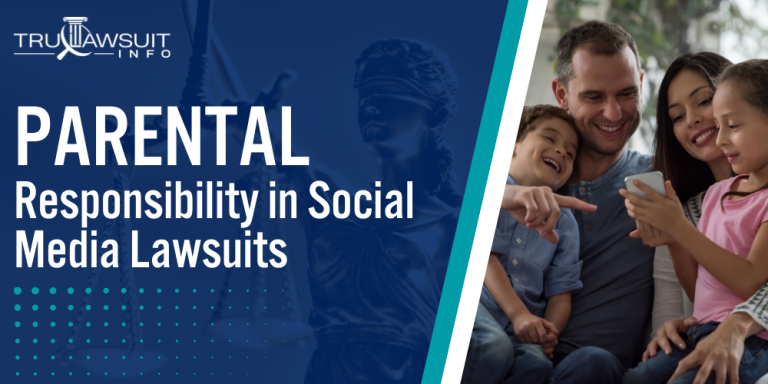
Intro to Parental Responsibility in Social Media
Some of the key aspects of parental responsibility in social media include, but are not limited to:
- Monitoring Usage: Parents have a responsibility to monitor their children’s social media use and ensure that it is age-appropriate and safe.
- Setting Boundaries: Parents should set clear boundaries and rules around social media use to prevent excessive or inappropriate use.
- Educating Children: Parents should educate their children about the risks and responsibilities associated with social media use.
- Legal Liability: Parents may be liable if their negligence in monitoring their children’s social media use leads to harm or illegal activity.
If your child has suffered harm due to your own or another parent’s negligence in monitoring social media use, you may have legal options to seek recourse.
Contact TruLawsuit Info using the chat on this page for an instant case evaluation to find out if you qualify to join others filing social media harm lawsuits.
Table of Contents
The Rise of Social Media Use Among Minors
Social media’s omnipresence in young people’s daily lives has led to an uptick in their digital social interactions.
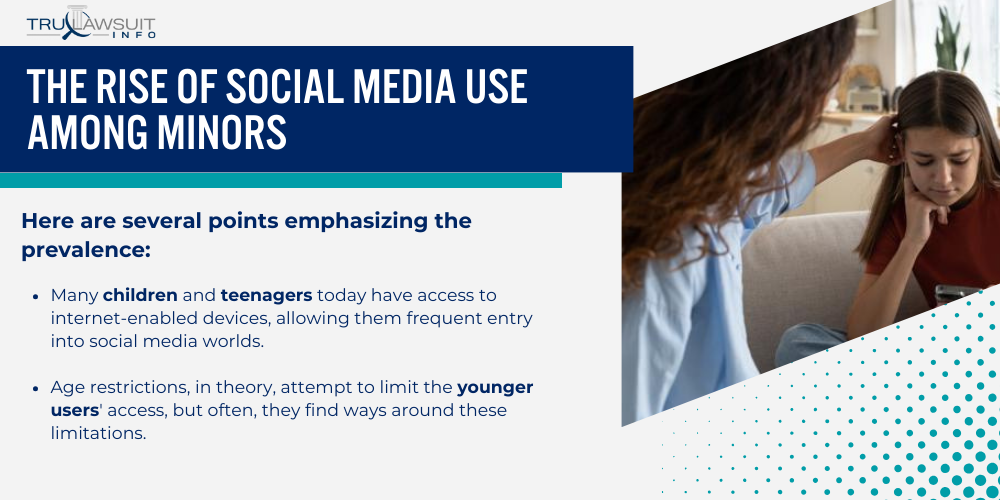
It is essential to understand the widespread use and the associated risks that come with minors navigating these online spaces.
Prevalence of Social Media Platforms Among Youth
Social media use among youngsters has become a norm.
The platforms are not only sources of entertainment but also a means for socializing and expressing oneself.
Here are several points emphasizing the prevalence:
- Many children and teenagers today have access to internet-enabled devices, allowing them frequent entry into social media worlds.
- Age restrictions, in theory, attempt to limit the younger users‘ access, but often, they find ways around these limitations.
- Recent studies suggest an increase in social media interactions, which stems from both youth’s curious nature and social pressures to stay connected.
- It’s observed that a considerable measure of one’s social life, especially during adolescence, is moving onto these social media platforms.
Potential Risks and Dangers for Minors on Social Media
Accompanying the increase in social media activity among minors are various potential dangers.
Boldly stated, the realm of social media is not devoid of risks:
- Despite community guidelines and controls, Exposure to potentially harmful and inappropriate content has been reported as a systemic issue across many platforms.
- Online harassment is a persistent threat, with minors being especially vulnerable to cyberbullying and other forms of digital aggression.
- The ease of contact with strangers online presents risks, as it may lead to uncomfortable encounters or unsafe situations.
- There is a growing concern over social media addiction, with young people spending inordinate amounts of time engaged in online activities to the detriment of real-world interactions.
Legal Basis for Parental Responsibility in Social Media
Social media has defined new parameters for parental responsibility, necessitating a legal framework to address minors’ online behavior.
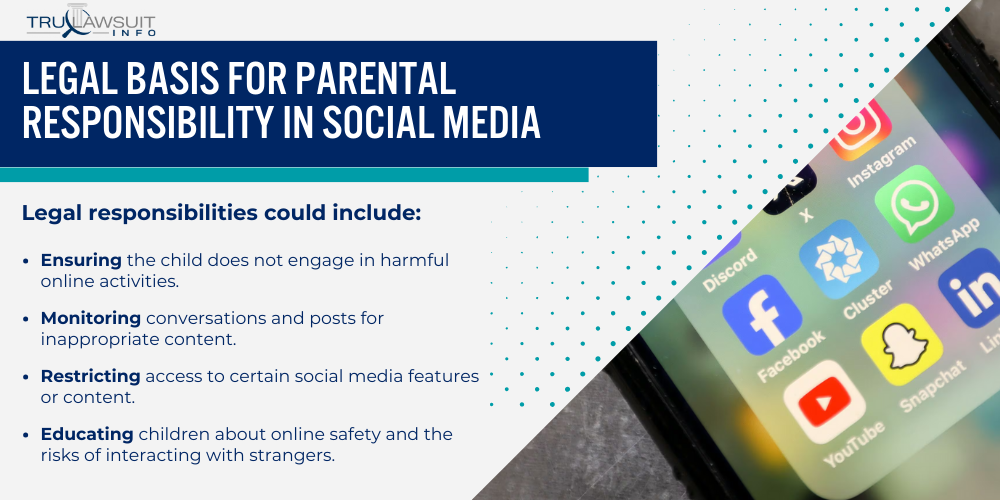
Parents play a critical role in regulating their children’s social media accounts and interactions with strangers online in the digital age.
Negligent Supervision and Failure to Monitor Claims
Parents who inadequately supervise or fail to monitor their children’s social media activities and cell phone usage may face legal action.
Legal responsibilities could include:
- Ensuring the child does not engage in harmful online activities.
- Monitoring conversations and posts for inappropriate content.
- Restricting access to certain social media features or content.
- Educating children about online safety and the risks of interacting with strangers.
Vicarious Liability for a Child’s Online Actions
Social media companies consider parents or guardians liable for their child’s online actions.
Vicarious liability may arise when:
- A child causes harm or defamation through a social media account.
- Parental responsibility is invoked to account for a minor’s conduct.
- Parents are expected to have control over their children’s usage of social media platforms.
- Social media companies may penalize the parent’s account for a child’s violations.
The legal basis surrounding parental responsibility in social media is evolving to meet the challenges of this new facet of our lives.
Notable Cases Involving Parental Responsibility in Social Media
In recent legal discourse, several high-profile cases have highlighted parents’ crucial role in monitoring and regulating their children’s social media use.
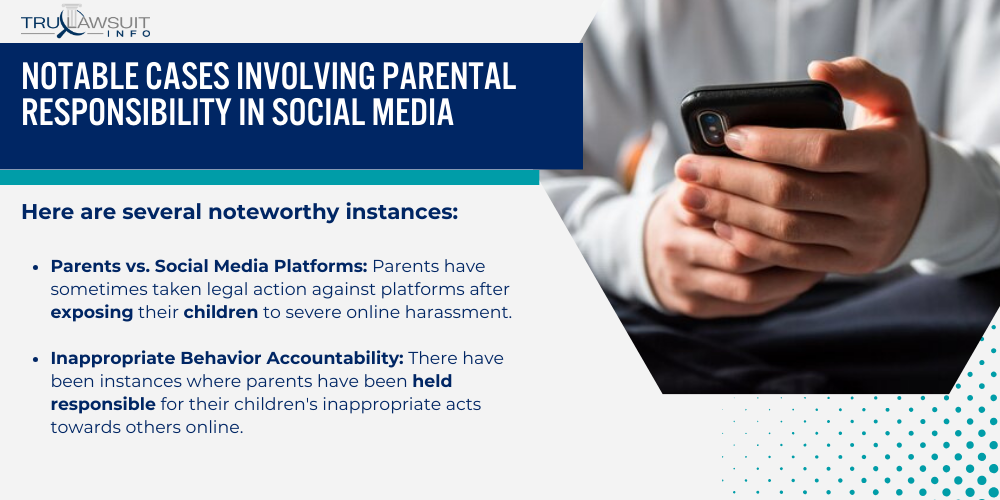
These cases have significantly impacted internet safety, online behavior, and privacy concerns.
Cyberbullying and Online Harassment Lawsuits
In response to incidents of cyberbullying, many social media companies have faced lawsuits for not doing enough to protect users, particularly minors.
Here are several noteworthy instances:
- Parents vs. Social Media Platforms: Parents have sometimes taken legal action against platforms after exposing their children to severe online harassment.
- Inappropriate Behavior Accountability: There have been instances where parents have been held responsible for their children’s inappropriate acts towards others online.
- Impact on Mental Health: The mental health repercussions for victims of cyberbullying have led to a deeper examination of how online behavior affects young users.
- Policy Improvements: Due to these lawsuits, some platforms have been urged to improve their policies on user-generated content to enhance online safety.
Cases Related to Sexting and Sharing Explicit Content
Parental responsibility extends to the management of situations where minors are involved in sexting or sharing explicit content.
Key litigation examples here include:
- Prosecution of Parents: There have been legal consequences for parents whose children engaged in sexting, with claims that the guardians were negligent in not preventing this behavior.
- Privacy Concerns: These cases often raise questions about a minor’s privacy rights versus a parent’s duty to monitor online behavior.
- Social Media Platform’s Duty to Act: The degree to which a social media company is responsible for detecting and stopping the dissemination of explicit content among minors has been tested in court.
- Education and Prevention Programs: In light of these cases, initiatives have been launched to educate both parents and minors on internet safety and the risks associated with sharing inappropriate content online.
Factors Considered in Determining Parental Liability
Two main factors are examined closely when establishing parental liability in social media.
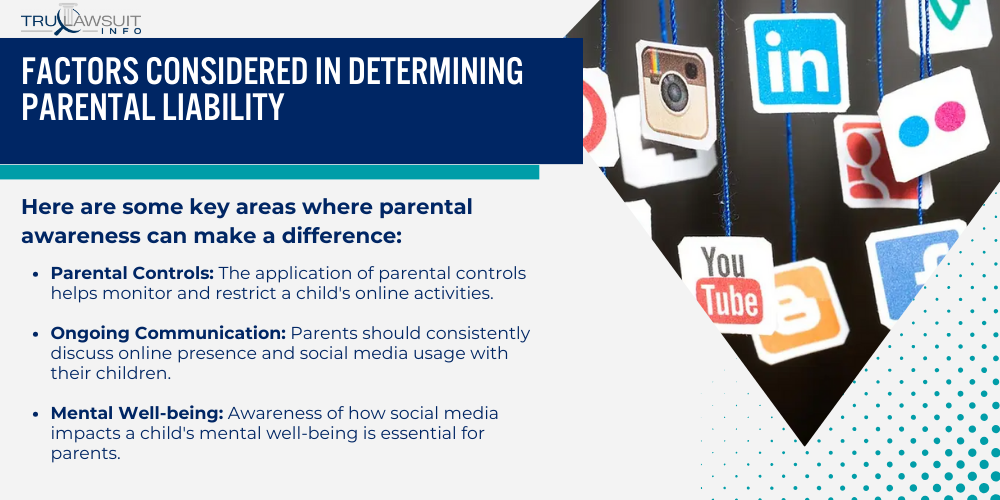
The parent’s awareness of their child’s online activities and their efforts to guide and monitor these interactions.
Knowledge of a Child’s Social Media Activities
Parents play a pivotal role in overseeing their children’s online lives to ensure their safety and well-being.
The extent of a parent’s knowledge about their child’s social media use is a significant factor in determining liability.
Here are some key areas where parental awareness can make a difference:
- Parental Controls: The application of parental controls helps monitor and restrict a child’s online activities.
- Ongoing Communication: Parents should consistently discuss online presence and social media usage with their children.
- Mental Well-being: Awareness of how social media impacts a child’s mental well-being is essential for parents.
- Online Privacy: Understanding and upholding a child’s online privacy reflects a parent’s attentiveness to their social media activities.
Efforts to Educate and Supervise Children Online
It’s not just about monitoring; educating children about digital literacy is vital.
Supervision includes both passive observation and active guidance to foster responsible behavior online.
To guide children in this digital age, parents should consider these key strategies:
- Educate Children: Parents must educate children on safely navigating the digital world.
- Digital Literacy: Elevating a child’s digital literacy is integral to their ability to stay informed and make good decisions online.
- Responsible Behavior: Encouraging responsible behavior in digital spaces is part of a parent’s supervisory role.
- Supervision and Moderation: Balancing supervision with respect for privacy teaches children about moderation in their daily online interactions.
Defenses Against Parental Responsibility Claims
Parents facing criticism or legal challenges due to their children’s online activity have a few strategies to shield themselves from responsibility claims.
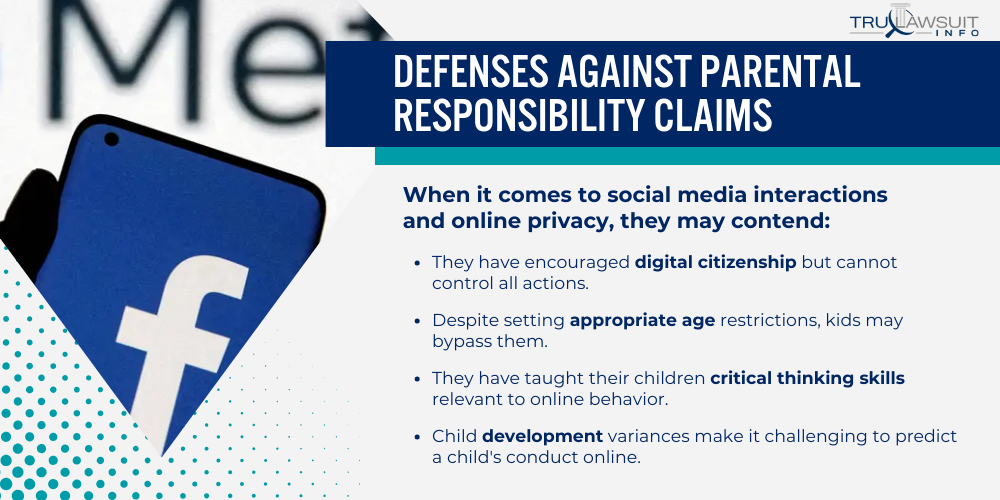
These defenses hinge on factors like control level and legal rights.
Arguing Lack of Awareness or Control Over a Child’s Actions
Parents can defend themselves by asserting that monitoring every aspect of a child’s life in the digital age is not feasible.
When it comes to social media interactions and online privacy, they may contend:
- They have encouraged digital citizenship but cannot control all actions.
- Despite setting appropriate age restrictions, kids may bypass them.
- They have taught their children critical thinking skills relevant to online behavior.
- Child development variances make it challenging to predict a child’s conduct online.
Invoking First Amendment Rights and Free Speech Protections
In the United States, First Amendment rights provide a robust defense that many parents turn to.
They assert that:
- Free speech protections may cover a child’s online expressions within legal and set limits.
- Parental guidance on the issue often incorporates respect for these legal rights.
- Punishing parents for a child’s speech might infringe upon constitutional rights.
- Children need to learn about these rights as part of overall digital citizenship education.
Strategies for Parents to Mitigate Legal Risks
In the ever-evolving social media landscape, parents play a vital role in safeguarding their children’s online presence and ensuring they avoid legal pitfalls.
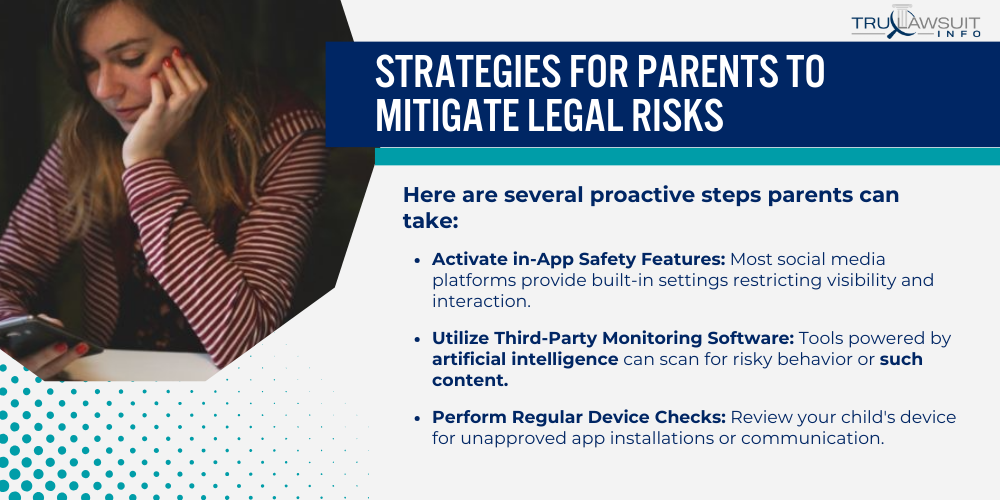
Implementing robust strategies and maintaining ongoing vigilance are essential for protecting children in the digital sphere.
Implementing Parental Controls and Monitoring Tools
Parental controls offer a first line of defense to help monitor a child’s interaction with social media platforms.
Here are several proactive steps parents can take:
- Activate in-App Safety Features: Most social media platforms provide built-in settings restricting visibility and interaction.
- Utilize Third-Party Monitoring Software: Tools powered by artificial intelligence can scan for risky behavior or such content.
- Perform Regular Device Checks: Review your child’s device for unapproved app installations or communication.
- Monitor Time Spent Online: Keep track of how much time children spend on social media to prevent excessive use.
These tools form part of a comprehensive social media safety strategy to help parents avoid potential risks.
Establishing Guidelines and Consequences for Social Media Use
When it comes to educating children on responsible digital citizenship, guidelines play an integral role.
Here’s how parents can enforce a social media policy at home:
- Draft Clear Usage Rules: Define what is acceptable and not in simple terms for the child to understand.
- Communicate The Importance of Privacy: Emphasize the significance of not sharing personal information online.
- Discuss the Legal Repercussions of Online Actions: Explain how behavior on social media can have real-world legal consequences.
- Set Firm Consequences: Be clear about the repercussions at home if the agreed-upon rules are violated.
Effective communication and clear rules help instill a sense of responsible digital citizenship and the importance of safeguarding one’s privacy.
By being proactive and creating a supportive environment, parents can significantly reduce the legal risks of social media use while promoting a healthy, informed approach to online activity.
U.S. Schools Nationwide: Addressing Social Media Issues
Schools across the United States are proactive in creating a safer online environment by implementing sound social media policies and engaging parents in an effort to foster responsible online behavior among students.
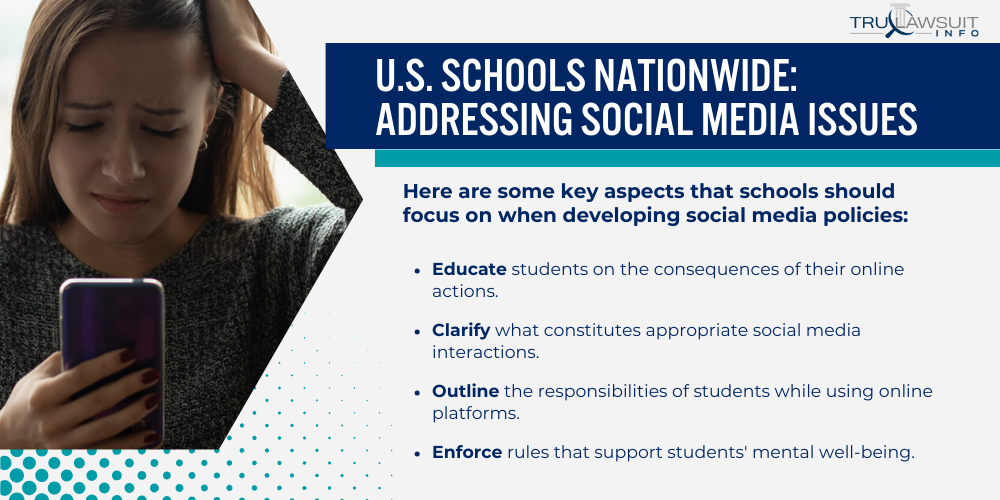
Developing Comprehensive Social Media Policies
Schools recognize the importance of social media in students’ lives and have begun formulating thorough social media guidelines.
These policies serve multiple purposes, from shaping students’ understanding of digital citizenship to delineating acceptable online conduct.
Here are some key aspects that schools should focus on when developing social media policies:
- Educate students on the consequences of their online actions.
- Clarify what constitutes appropriate social media interactions.
- Outline the responsibilities of students while using online platforms.
- Enforce rules that support students’ mental well-being.
By detailing these expectations, schools aim to create an open communication channel about the use and misuse of social media.
Collaborating with Parents to Promote Responsible Online Behavior
Schools understand that parents are key in extending digital education beyond the classroom.
To strengthen the partnership between schools and parents, consider these collaborative strategies:
- Encourage ongoing discussions between parents and children about online activities.
- Provide resources for parents to guide their children in making better online choices.
- Invite feedback from families about social media policy effectiveness.
- Organize workshops with tech companies to educate families on social media trends.
This team effort between schools and families is essential for nurturing responsible behavior on social media and supporting students’ mental well-being.
Balancing Parental Responsibility with a Child's Privacy Rights
In the digital era, parental responsibility must be balanced carefully against children’s privacy rights.
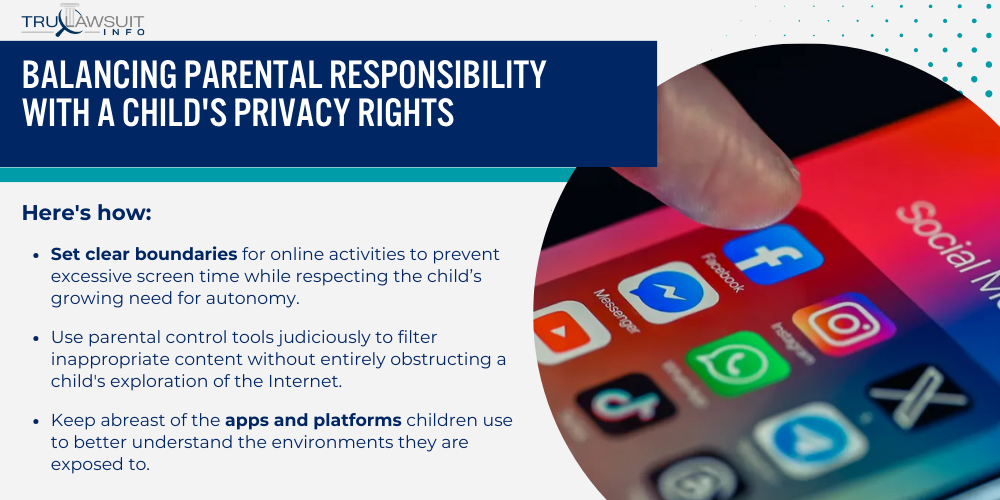
Ensuring children’s safety online and fostering trust is paramount as underage users navigate online spaces.
Monitoring a Child’s Online Activities
It’s essential to address monitoring concerns in the context of digital citizenship and child development.
Parents are responsible for guiding their children through the ever-evolving digital landscape, all while being mindful of their privacy.
Here’s how:
- Set clear boundaries for online activities to prevent excessive screen time while respecting the child’s growing need for autonomy.
- Use parental control tools judiciously to filter inappropriate content without entirely obstructing a child’s exploration of the Internet.
- Keep abreast of the apps and platforms children use to better understand the environments they are exposed to.
- Engage in regular discussions about the importance of privacy concerns to sensitize children to the risks and responsibilities of sharing information online.
Fostering Open Communication and Trust with Children
Ongoing communication between parents and children establishes a foundation of trust.
Here are ways this can be accomplished:
- Initiate conversations about online safety in an age-appropriate manner, ensuring children feel comfortable coming to their parents with concerns.
- Create an atmosphere where children feel they can share their online experiences openly, without fear of reprimand or loss of privacy.
- Demonstrate interest in their online interactions, showing that this is part of nurturing a caring relationship rather than solely monitoring behavior.
- Acknowledge and respect the child’s opinions and feedback on privacy settings and parental controls to reinforce mutual respect.
The balance of monitoring and communication helps in trust building, ultimately contributing to responsible digital citizenship among children.
TruLaw: #1 Social Media Lawyers
TruLaw stands at the forefront of internet safety and legal responsibilities in the ever-shifting terrain of social media law.
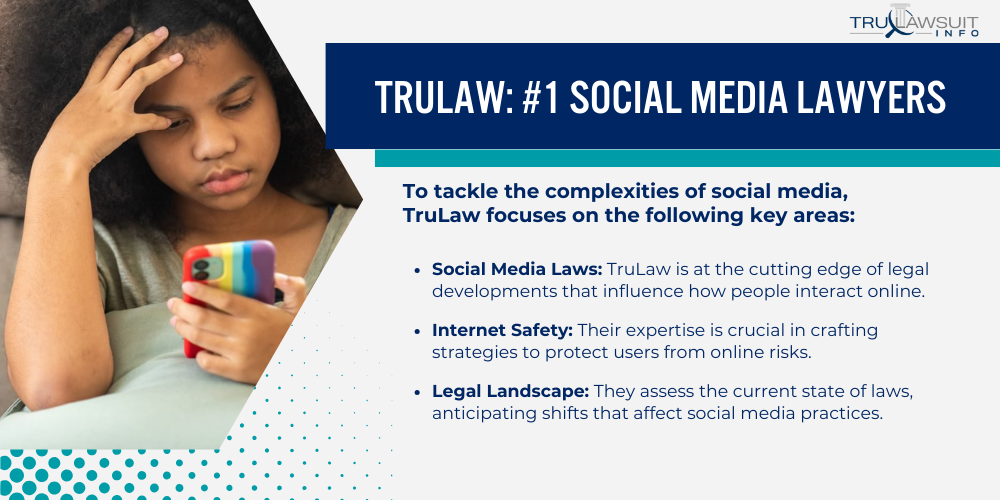
They provide robust legal services dedicated to fostering a safer online environment.
Legal Frameworks to Address Evolving Social Media Challenges
TruLaw is integral to formulating legal frameworks that adapt to new social media challenges.
They ensure that both individuals and companies navigate the legal landscape effectively, upholding online safety.
To tackle the complexities of social media, TruLaw focuses on the following key areas:
- Social Media Laws: TruLaw is at the cutting edge of legal developments that influence how people interact online.
- Internet Safety: Their expertise is crucial in crafting strategies to protect users from online risks.
- Legal Landscape: They assess the current state of laws, anticipating shifts that affect social media practices.
- Legal Responsibilities: They delineate what is required of users and platforms to ensure responsible use of social media.
- Online Safety: TruLaw prioritizes the creation of guidelines that bolster user security.
- Safer Online Environment: Their advocacy drives policy change for a more secure online community.
TruLaw’s leadership in adapting to new social media phenomena reflects its commitment to proactive and responsive legal approaches.
Their legal team tirelessly works to keep pace with social media’s rapid evolution, ensuring legal responsibilities are clear and enforceable.
Through steadfast research and informed policy recommendations, they play a pivotal role in building a framework for a safer online environment.
Frequently Asked Questions
-
What strategies can parents use to monitor their children's social media usage?
Parents should consider establishing open communication and setting clear guidelines to monitor social media usage effectively.
They may also use social media together with their children or employ monitoring software to track online activities.
-
What are the advantages and disadvantages of parents controlling their children's social media access?
Controlled access can safeguard children from online risks, promoting a safer digital environment.
However, stringent control may hinder the development of independent decision-making skills and could potentially lead to a lack of trust or secretive behavior.
-
How should parents balance their child's privacy with the need to ensure their safety on social media?
Parents should respect their child’s need for privacy while discussing the importance of online safety.
Privacy settings and mutual agreement on check-in points can establish a balanced approach, ensuring safety without undue invasion of privacy.
-
What tools are available for parents to manage or restrict social media use by their children?
Various tools, including parental control software, time management applications, and in-platform privacy settings, enable parents to manage or restrict social media use, tailoring the online experience to age-appropriate content and usage levels.
-
How does a parent’s perception of social media influence their approach to their children's online presence?
A parent’s view of social media, whether seen as a tool for connection or a source of risk, shapes their approach to their child’s online presence.
Positive perceptions may lead to more freedom and trust, while concerns can result in stricter oversight.
-
In what ways does social media usage impact the overall dynamics of parenting?
Social media has introduced new challenges and opportunities for parents.
It necessitates ongoing dialogue about digital literacy and ethics while providing a platform for parents to understand and engage with their children’s interests and online communities.

Experienced Attorney & Legal SaaS CEO
With over 25 years of legal experience, Jessie is an Illinois lawyer, a CPA, and a mother of three. She spent the first decade of her career working as an international tax attorney at Deloitte.
In 2009, Jessie co-founded her own law firm with her husband – which has scaled to over 30 employees since its conception.
In 2016, Jessie founded TruLaw, which allows her to collaborate with attorneys and legal experts across the United States on a daily basis. This hypervaluable network of experts is what enables her to share reliable legal information with her readers!
Have A Case?
Here, at Tru Lawsuit Info, we’re committed to helping victims get the justice they deserve.
To do this, we actively work to connect them with attorneys who are experts in litigating cases similar to theirs.
Would you like our help?
Tru Lawsuit Info is a reliable source of information about issues that may affect your health and safety, such as faulty products, data breaches, and environmental hazards.
Our team of experienced writers collaborates with medical professionals, lawyers, and advocates to produce informative articles, guides, and other resources that raise awareness of these topics.
Our thorough research provides consumers with access to reliable information and updates on lawsuits happening around the country. We also can connect consumers with attorneys if they need assistance.
Camp Lejeune's water contamination issue spanned several decades starting in the 1950s. Exposure to these chemicals has been linked to various serious health issues, including cancer, organ diseases, and death.
Research is increasingly suggesting a link between the use of Tylenol during pregnancy and the development of neurodevelopmental disorders, such as autism and ADHD, in infants.
Legal action is being taken against manufacturers of Aqueous Film-Forming Foam (AFFF), a chemical used in fighting fires. The plaintiffs allege that exposure to the foam caused health issues such as cancer, organ damage, and birth and fertility issues.
Have A Case?
Here, at Tru Lawsuit Info, we’re committed to helping victims get the justice they deserve.
To do this, we actively work to connect them with attorneys who are experts in litigating cases similar to theirs.
Would you like our help?







